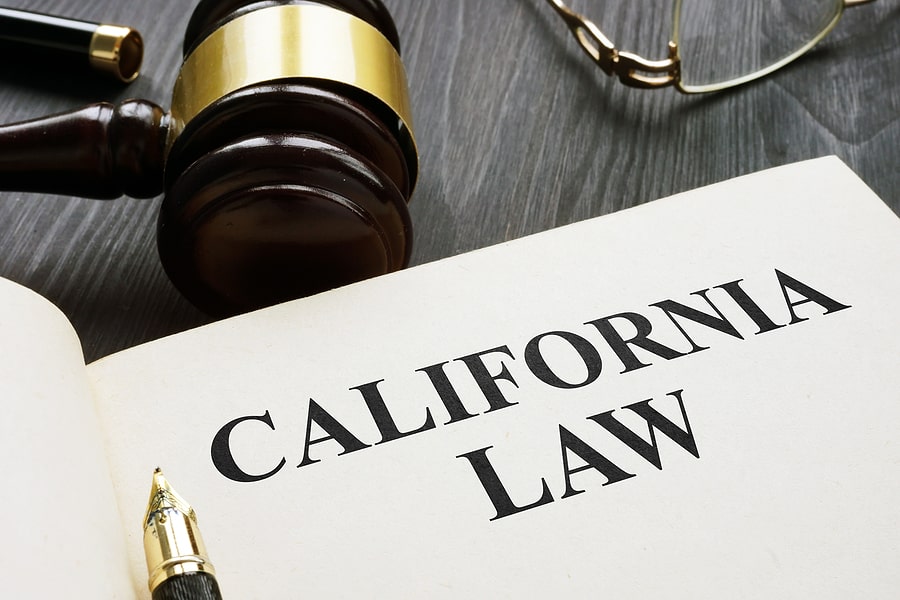
Weird laws: it seems as though every state has them on the books, even as lawmakers act to help keep the law up-to-date and relevant. With information available on the internet, it has become easier to take a look at potential weird laws and their impacts on you including the steps you need to take to ensure you remain in compliance with the law.
Have you seen these weird laws in California?
California residents cannot own ferrets.
Most states across the country welcome ferrets. However, California (and, interestingly, Hawaii) prohibits ferret ownership. These animals, and other non-native species like sugar gliders and hedgehogs, must not enter California as pets because they can prove hazardous to local California wildlife if they do, for any reason, get released into the wild.
Of course, California’s responsible pet owners often feel very strongly about their inability to have these familiar pets in their homes. California residents feel they can protect those animals and local wildlife at the same time. However, the California Department of Fish and Wildlife indicates that it does not have the resources to handle irresponsible pet owners who abandon their pets in the wild because those animals could quickly pose problems for local ecosystems.
Consequently, if you intend to purchase a ferret or any of their non-native cousins you will have to live outside California with your pet.
In Hermosa Beach, visitors and residents cannot legally spill salt on a local road.
According to local code 9.12.040, “spilling products on certain pavements” can cause serious consequences. Not only does this ordinance prohibit the use of potentially oily or dangerous materials, it also prohibits spilling of “any salt, rock salt, common salt,” or “salt brine” on the road. These substances, according to the Hermosa Beach code, could damage the pavement, resulting in increased costs for the city among other problems.
It begs the question, however, of what might happen if you accidentally spilled salt on the streets of Hermosa Beach. Suppose a margarita stand overturned. What might happen if a pretzel cook scattered the salt a bit too far? Suppose a patron scattered the contents of a salt packet on the ground while trying to prepare a meal purchased from a local food truck or restaurant: could that patron face consequences?
Hermosa Beach requires “every person” responsible for a toilet, washroom, or bath/shower room for employees or for the public to maintain it including keeping it stocked with toilet paper.
Hermosa Beach ordinance 8.48.010 requires all public restrooms to have toilet paper likely a relief for many people headed out to beaches, parks, and other recreational facilities throughout the Hermosa Beach area.
Most people have, at some point, had the horrible experience of entering a public washroom, only to discover the people responsible for maintaining it has failed to offer them the full range of products they need to complete that experience safely and cleanly. Luckily, in Hermosa Beach, residents and visitors alike can feel confident that if a restroom does not supply toilet paper, its owner may face consequences.
The ordinance also requires the owner of the facility, or the party responsible for maintaining it, to keep the “floors, walls, ceilings, lavatory, urinals, and toilet bowl free from any accumulation of dirt, filth, or corrosion” at all times. No exceptions for this public policy, which makes Hermosa Beach restrooms incredibly clean and sanitary at least, if they follow the law.
Ducks have right of way at all times on Rancho California Street in Temecula.
If you plan to zoom down Rancho California Street in Temecula, California, you may want to take a second look to make sure that you do not see any ducks in your way. Believe it or not, ducks always have the right of way on this popular street. That means you must make way for ducks, allowing them adequate room to safely pass at all times.
You may face substantial legal consequences if you ignore the presence of the ducks and try to go through them. While they might cause less damage to your vehicle than the average pedestrian, you still must slow down and make sure you provide adequate room for the duck(s) to safely cross the street.
As a point of interest, in Arcadia, peacocks also have right of way.
Women in California cannot drive while wearing a housecoat.
Some mornings, you just want to jump into the car and head out, whether you need to take the kids to school or run a couple of quick errands. Unfortunately, if you plan to do that as a woman in California, you will technically need to make sure you take off your housecoat while making that trip! Women in California cannot legally operate a motor vehicle while wearing a housecoat, otherwise known as a “nightie.”
As such, you should make sure you change into something more appropriate first. Or, alternately, take solace in the fact that this law is highly unlikely to ever be enforced.
Moral of the story: Jumping into the car in your pyjamas? Perfectly acceptable. Bathrobe? Maybe not.
Autonomous cars/driverless vehicles cannot exceed 60 miles per hour on the streets of California.
Autonomous vehicles have steadily increased in popularity. No longer the stuff of science fiction, they now have permission to travel. California approved two companies, Cruise and Waymo, to offer autonomous vehicle services to the public in September 2021.
These vehicles can provide a great deal of convenience, especially since they can provide rides to people who may not necessarily have the capacity to drive themselves for one reason or another.
However, those vehicles may also pose some dangers. Autonomous vehicles have no one to control them, which means they could result in costly accidents in the event an autonomous vehicle malfunctions. Some autonomous vehicles have also shown a lack of provision for potential hackers and other challenges, which could raise the risks their passengers might face on the road.
Fortunately, this California statute prevents those vehicles from moving at more than 60 miles per hour on the road. This statute serves to limit the way those vehicles can travel in an effort to eliminate potential risk inherent in fully autonomous vehicles. However, it may also prevent autonomous vehicles from traveling on popular interstates and highways, where the speed limit may exceed those recommendations. Furthermore, those vehicles may create traffic jams when travelling on larger streets, since they may have to drop below the speed limit.
As autonomous vehicles appear more frequently on the roads and pass rigorous safety tests, including showing a higher degree of practical capability on the road, California may have to revisit this statute to allow more freedom for people who prefer riding in these vehicles.
Los Angeles law specifically prohibits people from skateboarding or roller skating in the courthouse or library.
According to Los Angeles ordinance 17.20.010, visitors to Los Angeles courthouses and libraries must not enter the building on certain sets of wheels. If you planned for your trip to the library to include zipping through the aisles on your skates, or you wanted to speed up your trip to the courthouse by bringing your skateboard along, you might find yourself out of luck: this regulation prevents you from using that particular mode of transportation within those facilities.
As with many of the weird laws on the books, this ordinance brings one key question to mind: What happened to cause that specific law to pass into writing? Given the lengthy process involved to pass legislation, it is reasonable to assume that something catastrophic must have occurred involving roller skates, skateboards, or both in these public venues.
Fresno law prevents elementary schools from hosting any type of poker tournament.
According to Section 8-121, no person can play, participate in, or bet for or against games that involve gambling, including games such as poker tournaments, anywhere near a local school or educational institution. Not only does the ordinance prevent gambling in the elementary school directly, it also prevents gambling within three hundred feet of the school, if visitors can clearly see that place from school property. The law’s primary purpose is to protect elementary school students from needless exposure to a potentially addictive (and expensive) habit.
Located directly next to a school in Fresno? You may want to think twice about having a poker tournament in your home. Planning a game of blackjack in the backyard? According to this regulation, you could face substantial penalties. If you do plan to host a poker tournament in Fresno, make sure that it occurs somewhere besides the local elementary school, and that you close up the location tightly. The moral of the story is if you wish to partake in these activities, avoid advertising visibly near any educational facilities because you could find yourself in violation of the law.
The San Francisco Housing Code prevents residents from storing non-vehicle items in their garages.
Chapter 6 of the San Francisco housing code notes, “Private and public storage garages in apartment houses and hotels shall be used only for storage of automobiles.” Unlike other areas of the country, apparently, San Francisco does not want you to use your garage to store items that you might not otherwise have space for. Instead, you must store those items off-site or inside your home. No matter how tight space gets, storing non-automobile items in your garage means you could face fines of up to $500!
Tight on space? Tough! Looking to turn your garage into a man cave, a she-shed, or a retreat from the rest of the world? Not according to this ordinance. If you choose to get around San Francisco without a car of your own, you may not have the right to use that space at all. What a waste!
Glendale, California prohibits jumping from a moving vehicle going over 65 miles per hour.
According to a Glendale ordinance, you cannot jump out of a moving vehicle going at or above 65 miles per hour. Apparently, however, the ordinance does not have a provision for jumping out of a moving vehicle at less than that speed, despite the catastrophic injuries that will most certainly follow.
Visitors to Glendale should not jump out of a vehicle once it hits highway speeds. Of course, before that point, you should still avoid jumping out of a moving vehicle absent a very good reason to do so, since you could find yourself facing severe and even life-altering injuries.
California law, and, indeed, laws in the rest of the states, offers many examples of unique, weird, and interesting laws. Generally speaking, those laws exist because, at some point in time, a lawmaker saw substantial enough consequences from ignoring things that, in many cases, should remain common sense, and had to put in the effort to write them into law.
While these laws do bring to mind some amusing scenarios, the reality remains that breaking those laws can still have consequences. If someone injured you for violating one of California’s weirder laws, and you want to learn more about how to protect yourself, contact a lawyer as soon as possible.







